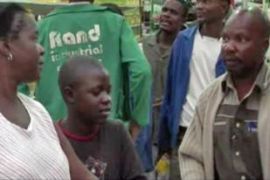Families struggling to survive
One man tells Al Jazeera of his struggle with food shortages and hyperinflation.

Prioritising needs
I’m Charles Mpofu, I live in Bulawayo in Nketa 9. I am married with three children and as a family we are five all in all.
It’s difficult for me and my family considering the salary that I receive on a monthly basis.
If I just calculate transport alone it’s over Zim$700,000 to and fro for a month or for four weeks.
When we are shopping we have to ask ‘what exactly do we need which is pressing in the home?’
It’s not easy to budget, it is even more of a headache when you get paid than when you are not paid.
Either you have not paid your rent, or you have not paid your electricity, or you have not paid your phone or you have been cut off or your water has been cut.
Deteriorating situation
The situation is worsening on a daily basis, not even improving.
We are becoming poorer, poorer, we are not improving from where we were when we got married.
Infact the situation is deteriorating. It’s going down, down everyday.
Things like milk, which most children like, I can’t buy them. I have decided completely to do away with it.
Just two litres of cooking oil, costs over Zim$250,000, automatically, it’s out of reach of my salary.
Future abroad
This is the situation that we are now debating, to say what type of business can we do here under these economic problems?
Nothing is moving. There are some obstructions in all directions.
My children will miss breakfast, miss lunch, go to school having not taken anything and only have one meal to make them survive.
And this is why I’m saying is it necessary for my children, if they happen to finish school, to learn, to work in this country?
I don’t think so, how much will they be paid?
So we are now saying they shoud stay for their graduation and then get them to go either to green pastures or neighbouring countries, or in Europe if ever they could, and that’s my hope.